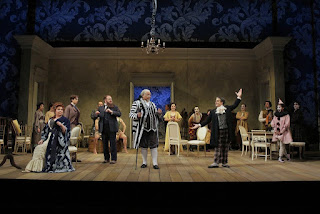Opera Theatre of Saint Louis: 'Ariadne on Naxos' deftly manages to toy with caprice and the high glamour of tragedy
 |
| The Major-Domo delivers his master's orders to the astonished entertainers. |
 |
| The zanies attempt to lift the abandoned Ariadne's dolor. |
The tug-of-war between high and low art has to suffer the biased officiating of commercialism today. In the perpetual ebb and flow of mass taste, however, the enduring struggle concerns not only how serious we choose to get about art, but about romantic love as well. Few people avoid some shifting between lofty and vulgar planes in either area. How consistently high-minded can anyone stand to be, after all?
In "Ariadne on Naxos," which the Opera Theatre of Saint Louis is presenting through June 24, the contrasting perspectives are shoved cheek-by-jowl into the same performance time and space. In the same way, the odd couple of high and low contends within us all. The history of this "prologue and opera in one act" is too complex to recount here, but in its final form the brilliant collaboration between Richard Strauss and his librettist, Hugo von Hofmannsthal, works as a unified whole.
Across the spectrum of the arts, of course, money talks. Here's this opera's generator: The odd conceit of the unseen Viennese aristocrat to have two opposing forms of entertainment offered simultaneously so a fireworks display can begin on time has the force of law to the hired help. Perfectionism and high-mindedness rub up against spontaneity and lightly cynical nonchalance.
This is the material of the Prologue, as a commedia dell'arte troupe jostles for attention against the majesty of an opera seria based on the hoary classical myth of the princess Ariadne's abandonment by her heroic kingly lover on a remote Mediterranean island. In the static world of Greek myth, love is eternal, fixed on one object, with any likely disappointment set as a prelude solely to death.
 |
| The troupe pays the requisite attention to its star, Zerbinetta. |
In the promiscuous affections of the comedians' world, on the other hand, no love affair can be stable (as one of them finds out to his sorrow in "Pagliacci," which OTSL presented in 2013).
The Major-Domo delivers news of the forced artistic marriage in the comically imperious manner of OTSL's Ken Page, in a speaking role. But the lavishly liveried servant is stonily oblivious to the nonsense that he has been sent to demand.
Stage director Sean Curran immediately signals his knack for controlled peppiness in the confused action of the Prologue. The clash of energy and egos is unrelenting, musically knitted together from the podium with Rory Macdonald, who is making his OTSL debut. The earnestness of high art gets traction in the fussy intensity of the Music-Master (Levi Hernandez), who is rightly anxious that his student, the Composer, will not suffer his achievement to be diminished by lowly mime, hijinks, puppetry, and flamboyant bad taste.
 |
| Bacchus and Ariadne find common ground on Naxos. |
The Prima Donna and the Tenor offer glimpses of the self-regard they will get to sublimate in "Ariadne on Naxos" as the forsaken princess and the traveling god Bacchus. Marjorie Owens and AJ Glueckert gave fine accounts of their roles. Owens displayed the sustained phrasing and studied melancholy required of the heroine, keeping her focus on what she assumes will be her deliverance to longed-for death.
She captured the type of operatic heroine stylistically and temperamentally at the opposite pole from Zerbinetta. In a cleverly choreographed scene featuring some of the most demanding coloratura in the repertoire, Park was transcendent as the philosophical coquette. In their attentions to her and to their unsought opportunity to tweak dead-serious music, Zerbinetta's colleagues were agile in their Renaissance-derived, pop-culture personas, moving acrobatically while tending well to their vocal tasks.
Bacchus' music has a consistent radiance and long-breathed eloquence. It shows up at first when he reaches Naxos' shores marveling at his escape from the sorceress Circe. His freedom from her spell is at first more physical than mental. Glueckert displayed a lover's devotion close to madness, thus mirroring the paralyzed mental state of Ariadne. Through music alone the two characters overcome the situations that brought them to this chance meeting, and the opera ends in fervent declarations of love.
In this production, that realization is accompanied by the placement of a host of candelabras all around the stage. The background widens to suggest a maritime sky as the two lovers confirm their new relationship. It's a luminous contrast visually to the manner in which the Prologue ends. There the naïve, stubborn Composer is revolted by the situation he faces -- against a tableau of the cast brightly three-dimensional in the glare of footlights. Low art is long, life is short.
The reduced orchestra of about three dozen works quite well in this theater. When grandeur is finally called for in the climactic scene of the opera seria, it has an ensemble backdrop of delicate piquancy to emerge from. Macdonald conducted with keen attention to the limitless Straussian virtuosity of style and suggestion — reflecting the theatrical breadth Strauss and his librettist embraced for the sake of depicting the eternal strife between esthetics and entertainment.
[Photos by Ken Howard]



Comments
Post a Comment